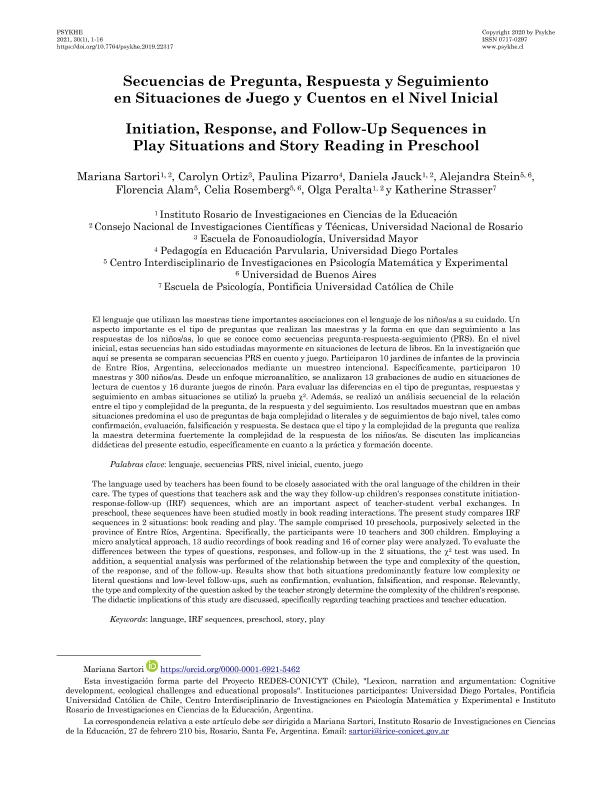Artículo
El lenguaje que utilizan las maestras muestra importantes asociaciones con el lenguaje de niños/as a su cuidado. Un aspecto importante es el tipo de preguntas que realizan las maestras y la forma en que responden a las respuestas de los niños/as, lo que se conoce como secuencias PRS (pregunta-respuesta-seguimiento). En el Nivel Inicial, estas secuencias han sido estudiadas mayormente en situaciones de lectura de libros. En la investigación que aquí se presenta, se comparan secuencias PRS en cuento y juego. Participaron 10 jardines de infantes de la provincia de Entre Ríos, Argentina. Se analizaron 13 grabaciones de audio en situaciones de lectura de cuentos y 16 durante juegos de rincón. Los resultados muestran que en ambas situaciones predomina el uso de preguntas de baja complejidad o literales y de seguimientos de bajo nivel, como confirmación, evaluación, falsificación y respuesta. Se destaca que el tipo y la complejidad de la pregunta que realiza la maestra determina fuertemente tanto la complejidad de la respuesta de los niños/as como el nivel del seguimiento. Se discuten implicancias para la práctica y la formación docente. The language used by teachers has been found to be closely associated with the oral language of the children in their care. The types of questions that teachers ask and the way they follow-up children's responses constitute initiation-response-follow-up(IRF) sequences, which arean important aspect of teacher-student verbal exchanges. In preschool, the sesequences have been studied mostly in book reading interactions. The present study compares IRF sequences in 2 situations: book reading and play. The sample comprised 10 preschools, purposively selected in the province of Entre Ríos, Argentina. Specifically, the participants were 10 teachers and 300 children. Employing a micro analytical approach, 13 audio recordings of book reading and 16 of corner play were analyzed. To evaluate the differences between the types of questions, responses, and follow-up in the 2 situations, the % test was used. In addition, a sequential analysis was performe d of the relationship between the type and complexity of the question, of the response, and of the follow-up. Results show that both situations predominantly feature low complexity or literal questions and low-level follow-ups, such as confirmation, evaluation, falsification, and response. Relevantly, the type and complexity of the question asked by the teacher strongly determine the complexity of the children's response. The didactic implications of this study are discussed, specifically regarding teaching practices and teacher education.
Secuencias de pregunta, respuesta y seguimiento en situaciones de juego y cuento en Nivel Inicial
Título:
Initiation, response, and follow-up sequences in play situations and story reading in Preschool
Sartori, Mariana ; Ortiz, Carolyn; Jauck, Daniela Eva
; Ortiz, Carolyn; Jauck, Daniela Eva ; Stein, Alejandra
; Stein, Alejandra ; Peralta, Olga Alicia
; Peralta, Olga Alicia ; Strasser, Katherine; Alam, Florencia
; Strasser, Katherine; Alam, Florencia ; Rosemberg, Celia Renata
; Rosemberg, Celia Renata
 ; Ortiz, Carolyn; Jauck, Daniela Eva
; Ortiz, Carolyn; Jauck, Daniela Eva ; Stein, Alejandra
; Stein, Alejandra ; Peralta, Olga Alicia
; Peralta, Olga Alicia ; Strasser, Katherine; Alam, Florencia
; Strasser, Katherine; Alam, Florencia ; Rosemberg, Celia Renata
; Rosemberg, Celia Renata
Fecha de publicación:
06/2021
Editorial:
Pontificia Universidad Catolica de Chile
Revista:
Psykhe
ISSN:
0718-2228
e-ISSN:
0717-0297
Idioma:
Español
Tipo de recurso:
Artículo publicado
Clasificación temática:
Resumen
Archivos asociados
Licencia
Identificadores
Colecciones
Articulos(CIIPME)
Articulos de CENTRO INTER. DE INV. EN PSICOLOGIA MATEMATICA Y EXP. "DR. HORACIO J.A RIMOLDI"
Articulos de CENTRO INTER. DE INV. EN PSICOLOGIA MATEMATICA Y EXP. "DR. HORACIO J.A RIMOLDI"
Citación
Sartori, Mariana; Ortiz, Carolyn; Jauck, Daniela Eva; Stein, Alejandra; Peralta, Olga Alicia; et al.; Secuencias de pregunta, respuesta y seguimiento en situaciones de juego y cuento en Nivel Inicial; Pontificia Universidad Catolica de Chile; Psykhe; 30; 1; 6-2021; 1-16
Compartir
Altmétricas



